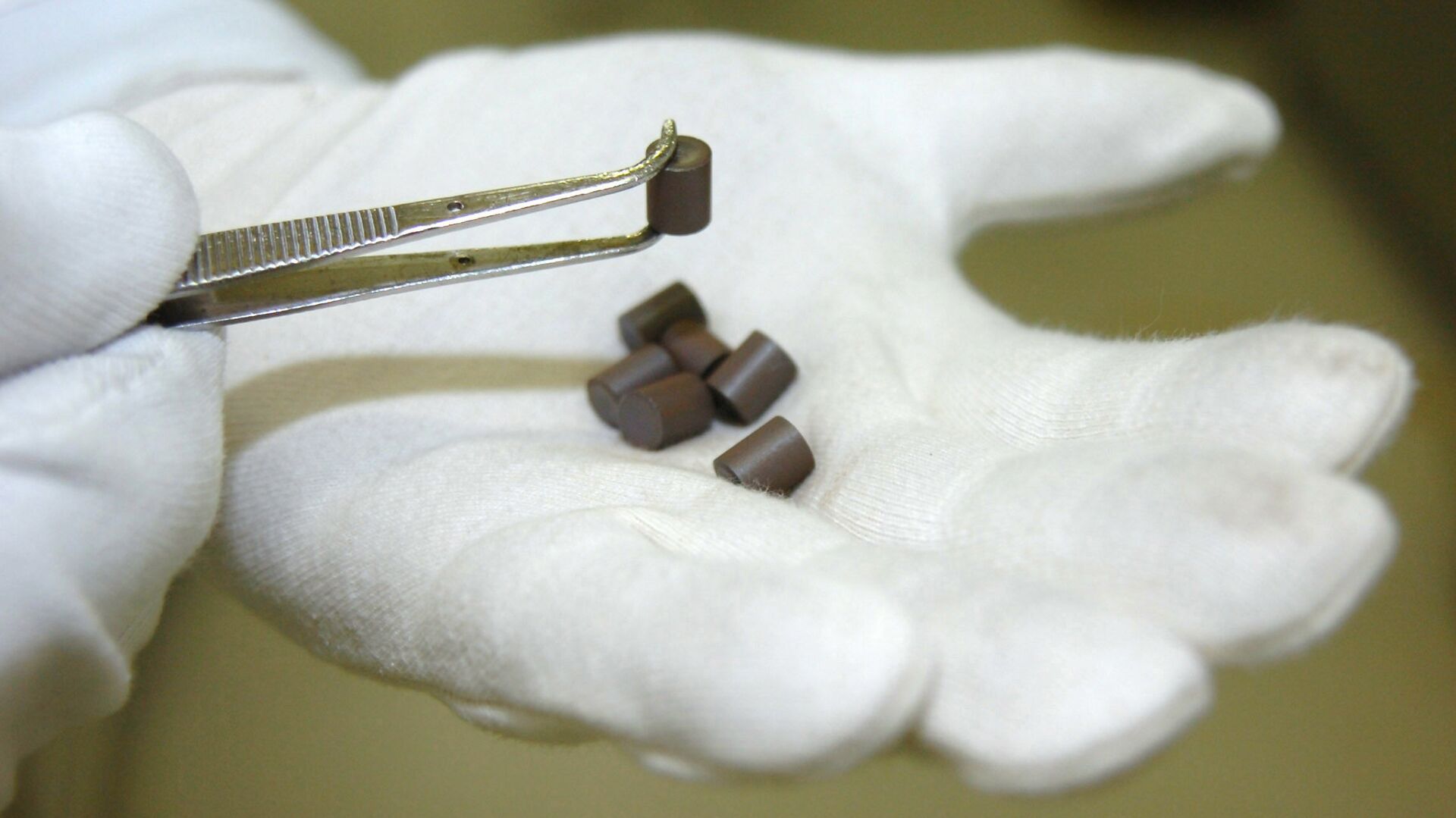https://sputnikglobe.com/20220309/us-ban-on-russian-energy-excludes-key-item-to-avoid-rolling-blackouts-across-american-cities-report-1093721032.html
US Ban on Russian Energy Excludes Key Item to Avoid Rolling Blackouts Across American Cities: Report
US Ban on Russian Energy Excludes Key Item to Avoid Rolling Blackouts Across American Cities: Report
Sputnik International
President Biden signed an executive order banning the import of Russian energy supplies on Tuesday, claiming the move would deal a “powerful blow” to Russian... 09.03.2022, Sputnik International
2022-03-09T13:59+0000
2022-03-09T13:59+0000
2022-03-09T14:05+0000
america
russia
uranium
https://cdn1.img.sputnikglobe.com/img/07e4/0c/02/1081335000_0:199:2283:1483_1920x0_80_0_0_69de8266cb09d2a01a4af7e61d969870.jpg
US imports of Russian uranium won’t be affected by President Biden’s ban on Russian energy, a source familiar with the situation has told Reuters. The text of the executive order signed by President Biden Tuesday does not include uranium in its list of banned Russian energy products.Nuclear power plants account for about 8.9 percent of US energy needs, including 20 percent of the country’s electricity, but America has no active uranium production or processing facilities, leaving it entirely dependent on imports.US media reported last week that the National Energy Institute, a trade group of US nuclear power generation companies including Duke Energy Corp and Exelon Corp, had engaged in heavy lobbying of the White House to keep Russian uranium deliveries off any sanctions plans amid fears that their inclusion could cause a dramatic surge in US electricity prices.“The [US nuclear] industry is just addicted to cheap Russian uranium,” a source familiar with the lobbying effort told Reuters last week.Texas and Wyoming are known to have large reserves of uranium, and several US firms have expressed an interest in the resumption of domestic mining and processing if long-term contracts with the industry could be secured. The Trump administration proposed the creation of a $150 million strategic uranium reserve in 2020, but the effort has yet to gain traction despite support for the idea from the Biden team.No More Sweetheart DealsThe United States has been heavily dependent on imports of uranium from Russia and the former Soviet Union since the early 1990s. In 1993, Vice President Al Gore and Russian Premier Viktor Chernomyrdin penned a 20-year, $11.9 billion deal on the delivery of over 550 metric tonnes of highly enriched uranium from tens of thousands of scrapped Russian nuclear warheads to the United States for use in American nuclear power plants.The agreement was shrouded in secrecy at the time that it was signed, and subsequent investigations by Russian lawmakers and media revealed that the real value of this uranium was at least $50 billion, and possibly as much as $400 billion. This uranium provided for about 10 percent of all electricity generated in the United States over a 15 year period, pumping out more than 7 billion megawatt hours of energy, equivalent to about 15 billion barrels of oil, or 3.5 billion tonnes of coal. The Gore-Chernomyrdin agreement has subsequently been criticized as an act of national betrayal by the Yeltsin administration, with Russia said to have lost 90 percent of its weapons-grade uranium as a result of the deal.After the agreement ran out, the US and Russia’s Rosatom signed new commercial contracts on the delivery of Russian uranium to the United States, but now at fair, internationally-set market prices.
https://sputnikglobe.com/20220308/biden-announces-ban-on-russian-oil-imports-1093693444.html
Sputnik International
feedback@sputniknews.com
+74956456601
MIA „Rosiya Segodnya“
2022
News
en_EN
Sputnik International
feedback@sputniknews.com
+74956456601
MIA „Rosiya Segodnya“
Sputnik International
feedback@sputniknews.com
+74956456601
MIA „Rosiya Segodnya“
america, uranium
US Ban on Russian Energy Excludes Key Item to Avoid Rolling Blackouts Across American Cities: Report
13:59 GMT 09.03.2022 (Updated: 14:05 GMT 09.03.2022) President Biden signed an executive order banning the import of Russian energy supplies on Tuesday, claiming the move would deal a “powerful blow” to Russian President Vladimir Putin. Russia accounts for just a sliver of American oil consumption, but together with its Central Asian allies provides the US with nearly half of a key energy resource.
US imports of Russian uranium won’t be affected by President Biden’s ban on Russian energy, a source familiar with the situation has told Reuters. The
text of the executive order signed by President Biden Tuesday does not include uranium in its list of banned Russian energy products.
Nuclear power plants account for
about 8.9 percent of US energy needs, including 20 percent of the country’s electricity, but America has no active uranium production or processing facilities, leaving it entirely dependent on imports.
46 percent of the uranium used by the US’s 56 operational nuclear power plants is imported from Russia and its Kazakh and Uzbek allies, with 22 percent coming from Canada, 11 percent from Australia, and five percent from Namibia. The US purchased about 10.2 million kg of uranium from Russia, Kazakhstan and Uzbekistan in 2020, according to data extrapolated from US Energy Information Administration
figures.
US media reported last week that the National Energy Institute, a trade group of US nuclear power generation companies including Duke Energy Corp and Exelon Corp, had engaged in heavy lobbying of the White House to keep Russian uranium deliveries off any sanctions plans amid fears that their inclusion could
cause a dramatic surge in US electricity prices.
“The [US nuclear] industry is just addicted to cheap Russian uranium,” a source familiar with the lobbying effort
told Reuters last week.
Texas and Wyoming are known to have large reserves of uranium, and several US firms have expressed an interest in the resumption of domestic mining and processing if long-term contracts with the industry could be secured. The Trump administration proposed the creation of a $150 million strategic uranium reserve in 2020, but the effort has yet to gain traction despite support for the idea from the Biden team.
The United States has been heavily dependent on imports of uranium from Russia and the former Soviet Union since the early 1990s. In 1993, Vice President Al Gore and Russian Premier Viktor Chernomyrdin
penned a 20-year, $11.9 billion deal on the delivery of over 550 metric tonnes of highly enriched uranium from tens of thousands of scrapped Russian nuclear warheads to the United States for use in American nuclear power plants.
The agreement was shrouded in secrecy at the time that it was signed, and subsequent investigations by Russian lawmakers and media revealed that the real value of this uranium was at least $50 billion, and possibly
as much as $400 billion. This uranium provided for about 10 percent of all electricity generated in the United States over a 15 year period, pumping out more than 7 billion megawatt hours of energy, equivalent to about 15 billion barrels of oil, or 3.5 billion tonnes of coal. The Gore-Chernomyrdin agreement has subsequently been criticized as an
act of national betrayal by the Yeltsin administration, with Russia said to have lost 90 percent of its weapons-grade uranium as a result of the deal.
After the agreement ran out, the US and Russia’s Rosatom signed new commercial contracts on the delivery of Russian uranium to the United States, but now at fair, internationally-set market prices.





